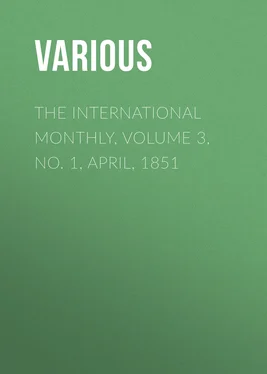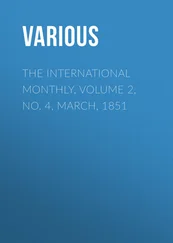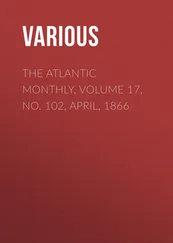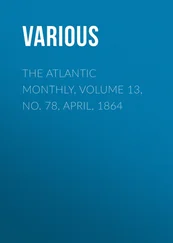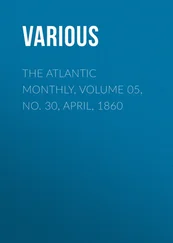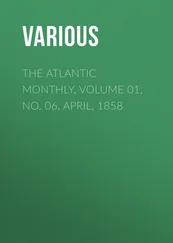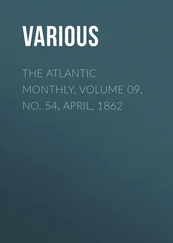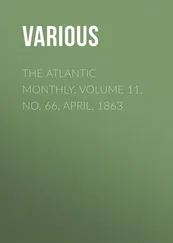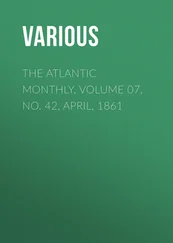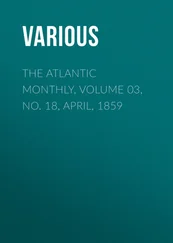Various - The International Monthly, Volume 3, No. 1, April, 1851
Здесь есть возможность читать онлайн «Various - The International Monthly, Volume 3, No. 1, April, 1851» — ознакомительный отрывок электронной книги совершенно бесплатно, а после прочтения отрывка купить полную версию. В некоторых случаях можно слушать аудио, скачать через торрент в формате fb2 и присутствует краткое содержание. Жанр: foreign_antique, periodic, foreign_edu, на английском языке. Описание произведения, (предисловие) а так же отзывы посетителей доступны на портале библиотеки ЛибКат.
- Название:The International Monthly, Volume 3, No. 1, April, 1851
- Автор:
- Жанр:
- Год:неизвестен
- ISBN:нет данных
- Рейтинг книги:3 / 5. Голосов: 1
-
Избранное:Добавить в избранное
- Отзывы:
-
Ваша оценка:
- 60
- 1
- 2
- 3
- 4
- 5
The International Monthly, Volume 3, No. 1, April, 1851: краткое содержание, описание и аннотация
Предлагаем к чтению аннотацию, описание, краткое содержание или предисловие (зависит от того, что написал сам автор книги «The International Monthly, Volume 3, No. 1, April, 1851»). Если вы не нашли необходимую информацию о книге — напишите в комментариях, мы постараемся отыскать её.
The International Monthly, Volume 3, No. 1, April, 1851 — читать онлайн ознакомительный отрывок
Ниже представлен текст книги, разбитый по страницам. Система сохранения места последней прочитанной страницы, позволяет с удобством читать онлайн бесплатно книгу «The International Monthly, Volume 3, No. 1, April, 1851», без необходимости каждый раз заново искать на чём Вы остановились. Поставьте закладку, и сможете в любой момент перейти на страницу, на которой закончили чтение.
Интервал:
Закладка:
The diet of Denmark has just voted to three poets of that nation a yearly pension of 1,000 thalers each. Two of them were H. Herz and Puludan Müller; the name of the third we do not know.
The book of the month in New-York has been Lavengro (published by Putnam and by the Harpers in large editions.) Its success was a consequence of the fame won by the author in his "Bible in Spain," &c., and of clever trickery in advertising. Generally, we believe, it has disappointed. We agree very nearly about it with the London Leader , that—
"It is worth reading, but not worth re-reading. A certain freshness of scene, with real vigor of style, makes you canter pleasantly enough through the volumes; but when the journey is over you find yourself arrived Nowhere. It is not truth, it is not fiction; neither biography nor romance; not even romantic biography; but three volumes of sketches without a purpose, of narratives without an aim. Mr. Borrow has hit the English taste by his union of the clerical and scholarly with what we may call manly blackguardism . His sympathies are all with the blackguards. Not with the ragged nondescripts of the streets, but the poetic vagabonds of the fields—the Rommany Chals—the Gipsies, who are as great in "horse-taming" as Hector of old, and great in the art of "self-defence" as any Greek before the walls of Troy—not to mention other peculiarities in respect of property and its conveyance which they share with the Greeks—the Gipsies in short who are vagabonds in the true wandering sense of the term."
James T. Fields has in press a new edition of his Poems, embracing the pieces which he has written since the edition of 1849. Mr. Fields has a just sense of poetical art; his compositions are happily conceived, and uniformly executed with the most careful elaboration. A few days ago we saw a letter from Miss Mitford, addressed to a friend in this country, in which he is referred to as one of the "living classics of our tongue." We perceive that he is to be the next anniversary poet of the Phi Beta Kappa at Harvard.
W. G. Simms has published at Charleston a fine poem entitled The City of the Silent , written for the occasion of the consecration of a cemetery near that city. It flows in natural harmony, and in thought as well as in manner has an appropriate dignity. We wonder that there has appeared no complete collection of the poems of Mr. Simms, which fill at least a dozen volumes, nearly all of which are now out of print. Some of his pieces have remarkable merit.
"Nile Notes by a Howadji," is not a book of travel, but the book of a traveller. The traveller is obviously a very charming and veracious one, but after all, the landscape and the persons, scenes, and manners he describes are so idealized by him as to have lost much of their natural identity, and put on the somewhat artificial look of museum specimens. However, the Notes are not, therefore, to us the less, but all the more, readable, because we have abundance of mere books of travel, and scarcely any traveller worth remarking. Mr. Kinglake, the author of Eothen , to be sure, was a host in himself. And Mr. Thackeray, in his Journey from Cheapside to Cairo , proved himself a fit companion of that gentleman. But a certain sneering humor, a certain mephistophelian irony, in these persons, prevent one from feeling entirely at ease with them, or believing, in fact, in their complete sincerity. It is not so with the author of Nile Notes , than whom a June breeze is not more bland, and moonlight not less gairish or oppressive. This conviction, indeed, strikes us in a very peculiar manner as we read, that no more genial nature ever penetrated that dismal and incredible East, to avouch the eternal freshness of man against the decay of nature and the mutability of institutions. An actually weird effect is produced by the sight of this plump and rosy Christian pervading the graves of dead empires, and thinking democracy amidst the listening ghosts of the Pharaohs. Did these solemn empires, did these absolute and strutting monarchs mistake their grandeur, and exist after all only that this modern democrat might laugh and live a life devoid of care? Such is the lesson of the book. It is sweeter to know the freshness and kindly nature that penned it; it is sweeter to feel the graceful and humane fancies that baptize every page of it, than to remember whole lineages of buried empires, or recognize whole pyramids of absolute and dissolved Pharaohs. The book is a mine of beautiful descriptions, and of sentences which tickle your inmost midriff with delight. (Harpers.)
We have been surprised lately at several long discussions in the New-York Historical Society of the question whether copies, extracts, or abstracts of the MSS. and other historical documents in the Society's collections might be published without the Society's special permission. We do not know who introduced the prohibitory proposition, but it is in the last degree ridiculous; there cannot be said in its support one syllable of reason; that it has been entertained so long is discreditable to the Society. The prime object of the Society is the collection and preservation of the materials of history; the more numerous the multiplication of copies, the more certain the probabilities of their preservation. A private collector may for obvious reasons hoard his treasures, and wish for the destruction of all copies of them; but the considerations which govern him are the last that should influence a historical society under similar circumstances.
Конец ознакомительного фрагмента.
Текст предоставлен ООО «ЛитРес».
Прочитайте эту книгу целиком, на ЛитРес.
Безопасно оплатить книгу можно банковской картой Visa, MasterCard, Maestro, со счета мобильного телефона, с платежного терминала, в салоне МТС или Связной, через PayPal, WebMoney, Яндекс.Деньги, QIWI Кошелек, бонусными картами или другим удобным Вам способом.
1
The first and second editions appeared in Philadelphia, and the third in Cooperstown. It was reprinted in 1830 in London, Paris, and Brussels: and an abridgment of it, by the author, has been largely introduced into common schools.
STATUE OF JOHN C. CALHOUN, BY HIRAM POWERS.
The above engraving of the statue of John C. Calhoun is from a daguerreotype taken in Florence immediately after the work was completed, and therefore presents it as it came from the hand of the sculptor, unmutilated by the accidents to which it was subjected in consequence of the wreck of the Elizabeth. The statue of Mr. Calhoun was contracted for, we believe, in 1845, and completed in 1850. It is the first draped or historical full-length by Mr. Powers, and it amply justifies the fame he had won in other performances by the harmonious blending of such particular excellences as he had exhibited in separation. It indeed illustrates his capacities for the highest range of historical portraiture and characterization, and will occasion regrets wherever similar subjects have in recent years been confided to other artists. We have heard that it is in contemplation to place in the park of our own city a colossal figure of Mr. Webster, by the same great sculptor. It is fit that while Charleston glories in the possession of this counterfeit of her dead Aristides (for in the indefectable purity of his public and private life Mr. Calhoun was surpassed by no character in the temples of Grecian or Roman greatness), New-York should be able to point to a statue of the representative of those ideas which are most eminently national, and of which she, as the intellectual and commercial metropolis of the whole country, is the centre. For plastic art, Mr. Webster may be regarded as perhaps the finest subject in modern history, and the head which Thorwaldsen thought must be the artist's ideal of the head of Jove, when modelled to the size of life, in the fit proportions of such a statue as is proposed, would be more imposing than any thing that has appeared in marble since the days of Praxitiles.
Читать дальшеИнтервал:
Закладка:
Похожие книги на «The International Monthly, Volume 3, No. 1, April, 1851»
Представляем Вашему вниманию похожие книги на «The International Monthly, Volume 3, No. 1, April, 1851» списком для выбора. Мы отобрали схожую по названию и смыслу литературу в надежде предоставить читателям больше вариантов отыскать новые, интересные, ещё непрочитанные произведения.
Обсуждение, отзывы о книге «The International Monthly, Volume 3, No. 1, April, 1851» и просто собственные мнения читателей. Оставьте ваши комментарии, напишите, что Вы думаете о произведении, его смысле или главных героях. Укажите что конкретно понравилось, а что нет, и почему Вы так считаете.
